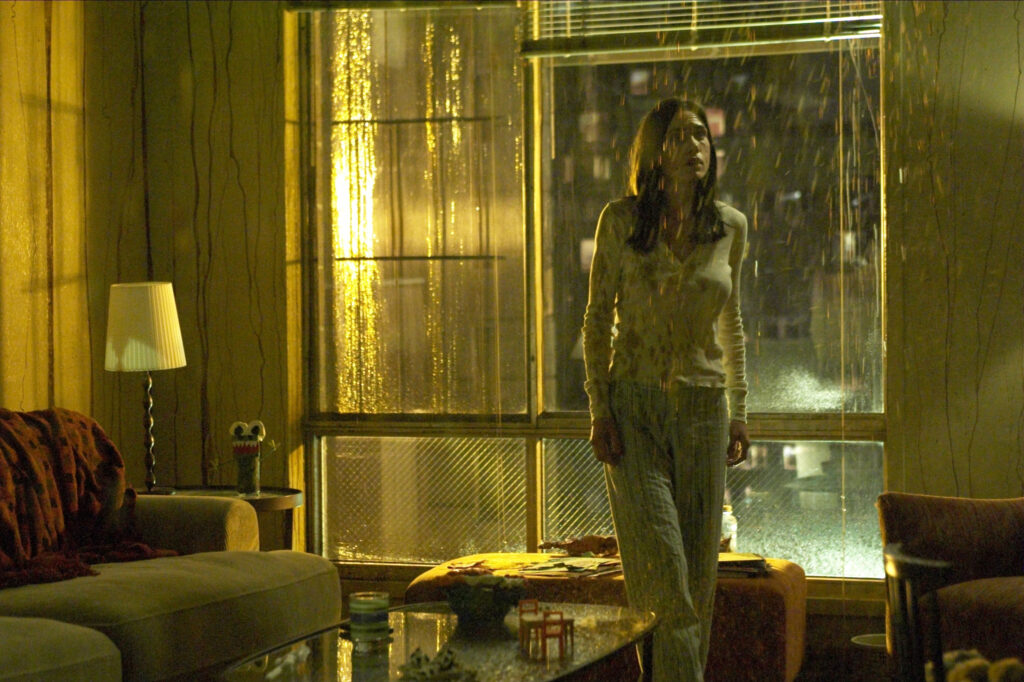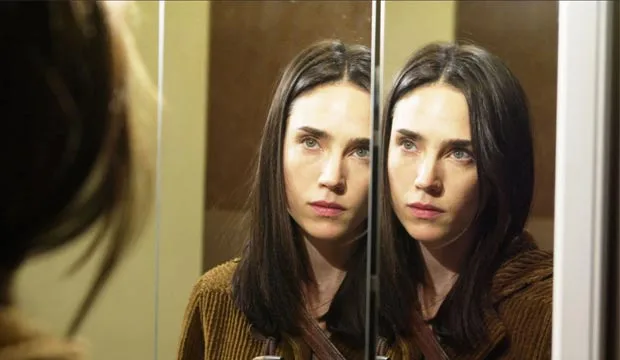“She left you behind.”
After The Ring exploded in popularity in 2002 – for good reason, because The Ring is art – Hollywood did what it always does: decide that the only thing audiences were interested in were remakes of Japanese horror films. Consequently, throughout the rest of the decade we got The Ring 2, The Grudge and its sequel, The Eye, One Missed Call, Pulse, The Echo, Shutter, Mirrors, The Uninvited, and 2005’s Dark Water. Like most of the aforementioned films, Dark Water hinges on a gimmick, but the deck is already stacked against Walter Salles’ (The Motorcycle Diaries) film: how do you make water scary? I’d love to tell you, but Dark Water doesn’t know the answer.
Dahlia (Jennifer Connelly) needs to find a new apartment. She’s in the middle of a messy custody battle with her cartoonishly evil ex-husband, Kyle (Dougray Scott, who seems to think he’s playing a loan shark or a henchman of some kind) who wants to take their daughter, Cecelia, to Jersey City with him. Dahlia doesn’t want to leave New York, so she rents a run-down two-bedroom on Roosevelt Island, close enough to Manhattan for a commute but far enough that Cecelia laments having to live in a smaller town. The building manager, Mr. Murray, is played by John C. Reilly, the first of three veteran actors to make a meal of their small roles. Reilly doesn’t ham it up and he doesn’t chew the scenery – you can tell this was a paycheck job for him – but he imbues Murray with the right balance of smarm and charm: nice enough to woo Dahlia into taking the apartment, condescending enough to dismiss any of Cecelia’s concerns. (Reilly has a scene later where he’s eating a sandwich at his desk, and it’s just great sandwich acting. I’m not being sarcastic.)

The other welcome surprise is Pete Postlethwaite, playing the building’s super, Mr. Veeck (rhymes with Beck). Veeck is of indeterminate Eastern European origin, and Postlethwaite plays him as the crusty-yet-benign type we’re all familiar with. He’s chastised by Murray for leaving the door to the roof open; Cecelia had scampered up there and returned with a Hello Kitty backpack. We might as well take a break here to talk about the story behind Dark Water, which you’re likely familiar with.
In 2012, Elisa Lam checked in to the Hotel Cecil in Hollywood (the connection isn’t subtle in Cecil/Cecelia). Elevator footage showed her distraught, and after she disappeared she was discovered to have drowned in the hotel’s water tank. It’s one of LA’s more infamous urban legends, especially because it’s still so shrouded in mystery. In addition to this, it was also an inspiration for Hotel, the fifth season of American Horror Story. Riffing on the Elisa Lam story is a troublesome gambit, because it all leads up to that big reveal. Consequently, Dark Water is longer than it needs to be, and if you have any passing familiarity with Lam’s grisly fate then you can already guess the ending (and you’d be right).
One thing Dark Water does well is isolate Dahlia and Cecelia. Their apartment is in the middle of a brutalist compound: dense, ugly, claustrophobic. The elevator works only sporadically, and sometimes of its own accord. The windows in Dahlia’s apartment won’t open, and she has to take an elevated tram from Manhattan to reach her home. She’s inaccessible, but more than that, she’s trapped. This is made plain in a remark from another resident; he says sometimes the elevator just goes to the tenth floor even without being called. Dahlia has less and less control as the film goes on, and the elevator is the first instance of that. Veeck says that Cecelia is the only child in the building, and over time the isolation starts to feel more like imprisonment. (This would arguably be a stronger movie if it took place only in the building; for an example of a single-setting horror movie that works brilliantly, take a look at mother!)

Of greater concern is the ever-expanding water leak in Dahlia’s bedroom. To the film’s credit, the stain is ugly, looking more like a scab than anything; to the film’s discredit, everything is so uniformly drab that the stain doesn’t stick out as much as it should or could, robbing it of some of its power to discomfit. Water isn’t scary, no; but there’s something unsettling about the brackish sludge that seeps out of the ceiling. Salles has some fun with this, even if the film gets pretty one-note with its atmosphere. Still, there’s a jarring scene in which a clump of hair comes out of the tap, and even though Dahlia seems to take it in stride (why??), one wishes that Dark Water had more moments like this one.
Instead, the film spins its wheels with the ins and outs of Dahlia and Kyle’s custody battle. The upside to this is that we get to the third veteran actor who livens things up: Tim Roth as Dahlia’s lawyer, Jeff Platzer. He’s disheveled and put-upon, using his car as an office; if this were made today, he’d be played by Bill Camp. Jeff is a minor role, but Roth is able to grant him interiority; one of my favorite scenes in the film has him telling Dahlia he can’t talk because he’s at the movies with his family, when in reality he’s alone. This is never explained or remarked upon, but I appreciate Dark Water taking the time to establish the reality of one of its supporting players.
But the film, really, belongs to Connelly, and it’s easy to see why she would sign on for a project like this, even post-Oscar win. Dahlia is in almost every scene, and Connelly is a commanding enough presence that she carries the movie even through its moments of dullness or meandering, like one of its many dream sequences. Typically, 99% of dream sequences are to hammer home the themes of the film for anyone who hadn’t picked up on it, and Dark Water is no exception. The themes of child abandonment and generational trauma had been well established by the time the dreams start, and the film would be stronger without their inclusion.
Overall, Dark Water is a bit of a mixed bag. I can’t say it’s worth your time, because even with how watchable Connelly is, the material is too thin for her to save by herself, and Reilly, Postlethwaite, and Roth aren’t in it enough to shoulder any of the burden. And Dougray Scott just makes things worse with his performance, so there’s no help coming from him. There are better ways to spend 100 minutes, but if you see this come on TV – preferably on a rainy day – it might be worth checking out.

